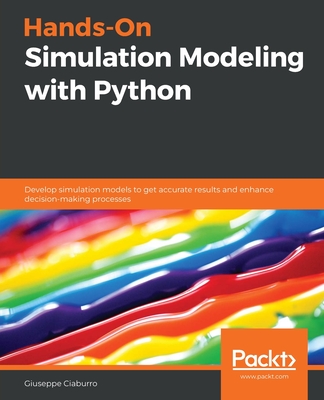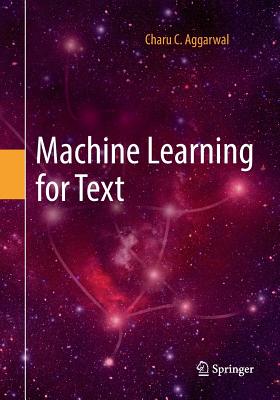Linear Algebra and Optimization for Machine Learning: A Textbook (Hardcover)
暫譯: 機器學習的線性代數與優化:教科書(精裝版)
Aggarwal, Charu C.
- 出版商: Springer
- 出版日期: 2020-05-13
- 售價: $2,600
- 貴賓價: 9.5 折 $2,470
- 語言: 英文
- 頁數: 516
- 裝訂: Hardcover - also called cloth, retail trade, or trade
- ISBN: 3030403432
- ISBN-13: 9783030403430
-
相關分類:
Machine Learning、線性代數 Linear-algebra
-
其他版本:
Linear Algebra and Optimization for Machine Learning: A Textbook (Paperback)
立即出貨
買這商品的人也買了...
-
 $1,853Introduction to Machine Learning with Python: A Guide for Data Scientists (Paperback)
$1,853Introduction to Machine Learning with Python: A Guide for Data Scientists (Paperback) -
 $1,980The Data Science Design Manual (Texts in Computer Science)
$1,980The Data Science Design Manual (Texts in Computer Science) -
 邏輯力:邏輯思考的入門書 (修訂版)
邏輯力:邏輯思考的入門書 (修訂版)$260$234 -
 $1,840Machine Learning with Python Cookbook: Practical Solutions from Preprocessing to Deep Learning
$1,840Machine Learning with Python Cookbook: Practical Solutions from Preprocessing to Deep Learning -
 Python 3.7 技術手冊
Python 3.7 技術手冊$560$442 -
 物件導向 Python 與 TensorFlow 應用
物件導向 Python 與 TensorFlow 應用$490$441 -
 $1,911An Introduction to Categorical Data Analysis, 3/e (Hardcover)
$1,911An Introduction to Categorical Data Analysis, 3/e (Hardcover) -
 圖解 Fintech 的知識與技術
圖解 Fintech 的知識與技術$480$408 -
 Mathematics for Machine Learning (Paperback)
Mathematics for Machine Learning (Paperback)$1,480$1,450 -
 Hands-On Simulation Modeling with Python: Develop simulation models to get accurate results and enhance decision-making processes
Hands-On Simulation Modeling with Python: Develop simulation models to get accurate results and enhance decision-making processes$2,550$2,423 -
 智慧新世界--圖靈所沒有預料到的人工智慧
智慧新世界--圖靈所沒有預料到的人工智慧$400$316 -
 $352TensorFlow + Keras 自然語言處理實戰
$352TensorFlow + Keras 自然語言處理實戰 -
 Deep Learning: A Visual Approach (Paperback)
Deep Learning: A Visual Approach (Paperback)$3,600$3,420 -
 Math for Deep Learning: What You Need to Know to Understand Neural Networks (Paperback)
Math for Deep Learning: What You Need to Know to Understand Neural Networks (Paperback)$1,800$1,710 -
 Probabilistic Machine Learning: An Introduction (Hardcover)
Probabilistic Machine Learning: An Introduction (Hardcover)$2,650$2,597 -
 Structure and Interpretation of Computer Programs: JavaScript Edition (Paperback)
Structure and Interpretation of Computer Programs: JavaScript Edition (Paperback)$2,680$2,626 -
 Python - 最強入門 ChatGPT 助攻邁向數據科學之路 - 王者歸來 (全彩印刷第四版)
Python - 最強入門 ChatGPT 助攻邁向數據科學之路 - 王者歸來 (全彩印刷第四版)$1,200$948 -
 Understanding Deep Learning (Hardcover)
Understanding Deep Learning (Hardcover)$2,150$2,107 -
 The Language of Deception: Weaponizing Next Generation AI (Paperback)
The Language of Deception: Weaponizing Next Generation AI (Paperback)$1,330$1,264 -
 Computability and Complexity (Hardcover)
Computability and Complexity (Hardcover)$2,370$2,323 -
 Machine Learning Interviews: Kickstart Your Machine Learning and Data Career (Paperback)
Machine Learning Interviews: Kickstart Your Machine Learning and Data Career (Paperback)$2,830$2,689 -
 Visualization of Time-Oriented Data (Hardcover)
Visualization of Time-Oriented Data (Hardcover)$2,580$2,451 -
 Learn Python the Hard Way (Paperback)
Learn Python the Hard Way (Paperback)$1,580$1,501 -
 Python x AI 辦公室作業自動化 : Word、Excel、PowerPoint、PDF、CSV、Pandas -- 多執行緒、排程、藝術二維碼、短網址、電子郵件、爬蟲
Python x AI 辦公室作業自動化 : Word、Excel、PowerPoint、PDF、CSV、Pandas -- 多執行緒、排程、藝術二維碼、短網址、電子郵件、爬蟲$880$695 -
 人工智慧的現在與未來:它將如何改變全世界
人工智慧的現在與未來:它將如何改變全世界$680$537
商品描述
This textbook introduces linear algebra and optimization in the context of machine learning. Examples and exercises are provided throughout this text book together with access to a solution's manual. This textbook targets graduate level students and professors in computer science, mathematics and data science. Advanced undergraduate students can also use this textbook. The chapters for this textbook are organized as follows:
1. Linear algebra and its applications: The chapters focus on the basics of linear algebra together with their common applications to singular value decomposition, matrix factorization, similarity matrices (kernel methods), and graph analysis. Numerous machine learning applications have been used as examples, such as spectral clustering, kernel-based classification, and outlier detection. The tight integration of linear algebra methods with examples from machine learning differentiates this book from generic volumes on linear algebra. The focus is clearly on the most relevant aspects of linear algebra for machine learning and to teach readers how to apply these concepts.
2. Optimization and its applications: Much of machine learning is posed as an optimization problem in which we try to maximize the accuracy of regression and classification models. The "parent problem" of optimization-centric machine learning is least-squares regression. Interestingly, this problem arises in both linear algebra and optimization, and is one of the key connecting problems of the two fields. Least-squares regression is also the starting point for support vector machines, logistic regression, and recommender systems. Furthermore, the methods for dimensionality reduction and matrix factorization also require the development of optimization methods. A general view of optimization in computational graphs is discussed together with its applications to back propagation in neural networks.
A frequent challenge faced by beginners in machine learning is the extensive background required in linear algebra and optimization. One problem is that the existing linear algebra and optimization courses are not specific to machine learning; therefore, one would typically have to complete more course material than is necessary to pick up machine learning. Furthermore, certain types of ideas and tricks from optimization and linear algebra recur more frequently in machine learning than other application-centric settings. Therefore, there is significant value in developing a view of linear algebra and optimization that is better suited to the specific perspective of machine learning.
商品描述(中文翻譯)
這本教科書介紹了在線性代數和優化的背景下,機器學習的相關內容。全書提供了範例和練習題,並附有解答手冊。本教科書的目標讀者為計算機科學、數學和數據科學的研究生及教授,進階的本科生也可以使用這本教科書。本教科書的章節組織如下:
1. 線性代數及其應用:這些章節專注於線性代數的基本概念及其在奇異值分解、矩陣分解、相似矩陣(核方法)和圖分析等常見應用中的應用。書中使用了許多機器學習的應用作為範例,例如光譜聚類、基於核的分類和異常檢測。線性代數方法與機器學習範例的緊密結合,使本書與一般的線性代數書籍有所區別。重點明確放在機器學習中最相關的線性代數方面,並教導讀者如何應用這些概念。
2. 優化及其應用:機器學習的許多問題被表述為優化問題,我們試圖最大化回歸和分類模型的準確性。以優化為中心的機器學習的「母問題」是最小二乘回歸。有趣的是,這個問題同時出現在線性代數和優化中,並且是這兩個領域的關鍵連接問題之一。最小二乘回歸也是支持向量機、邏輯回歸和推薦系統的起點。此外,降維和矩陣分解的方法也需要開發優化方法。書中討論了計算圖中的優化的一般觀點及其在神經網絡反向傳播中的應用。
機器學習初學者經常面臨的一個挑戰是需要廣泛的線性代數和優化背景。一個問題是現有的線性代數和優化課程並不專門針對機器學習;因此,通常需要完成比學習機器學習所需的更多課程內容。此外,某些來自優化和線性代數的想法和技巧在機器學習中比其他應用中心的環境中更頻繁地出現。因此,發展一種更適合機器學習特定視角的線性代數和優化觀點具有重要價值。
作者簡介
Charu C. Aggarwal is a Distinguished Research Staff Member (DRSM) at the IBM T. J. Watson Research Center in Yorktown Heights, New York. He completed his undergraduate degree in Computer Science from the Indian Institute of Technology at Kanpur in 1993 and his Ph.D. in Operations Research from the Massachusetts Institute of Technology in 1996. He has published more than 400 papers in refereed conferences and journals and has applied for or been granted more than 80 patents. He is author or editor of 19 books, including textbooks on data mining, neural networks, machine learning (for text), recommender systems, and outlier analysis. Because of the commercial value of his patents, he has thrice been designated a Master Inventor at IBM. He has received several internal and external awards, including the EDBT Test-of-Time Award (2014), the IEEE ICDM Research Contributions Award (2015), and the ACM SIGKDD Innovation Award (2019). He has served as editor-in-chief of the ACM SIGKDD Explorations, and is currently serving as an editor-in-chief of the ACM Transactions on Knowledge Discovery from Data. He is a fellow of the SIAM, ACM, and the IEEE, for "contributions to knowledge discovery and data mining algorithms."
作者簡介(中文翻譯)
Charu C. Aggarwal 是位於紐約約克鎮的 IBM T. J. Watson 研究中心的傑出研究人員 (Distinguished Research Staff Member, DRSM)。他於 1993 年在印度理工學院坎普爾校區獲得計算機科學學士學位,並於 1996 年在麻省理工學院獲得運籌學博士學位。他在經過審核的會議和期刊上發表了超過 400 篇論文,並申請或獲得了超過 80 項專利。他是 19 本書籍的作者或編輯,包括有關資料探勘、神經網絡、機器學習(針對文本)、推薦系統和異常分析的教科書。由於其專利的商業價值,他三度被 IBM 指定為大師發明家 (Master Inventor)。他獲得了多項內部和外部獎項,包括 EDBT Test-of-Time 獎(2014 年)、IEEE ICDM 研究貢獻獎(2015 年)和 ACM SIGKDD 創新獎(2019 年)。他曾擔任 ACM SIGKDD Explorations 的主編,目前擔任 ACM Transactions on Knowledge Discovery from Data 的主編。他是 SIAM、ACM 和 IEEE 的會士,因其對知識發掘和資料探勘演算法的貢獻而獲得此榮譽。










